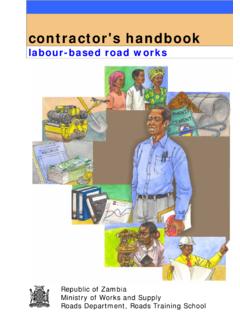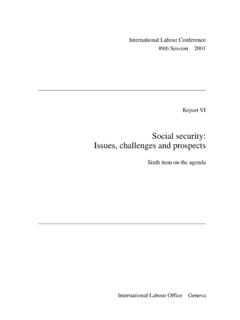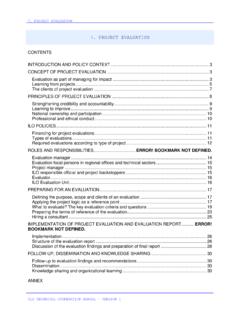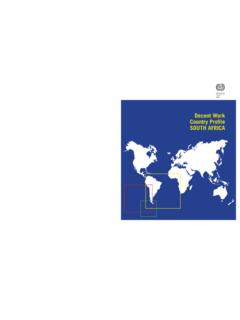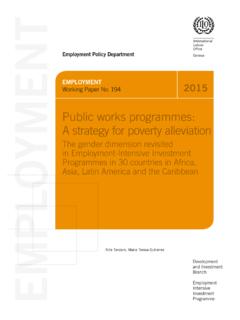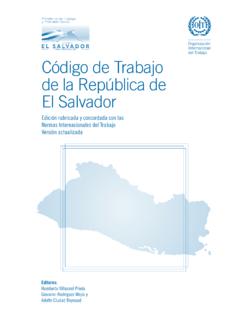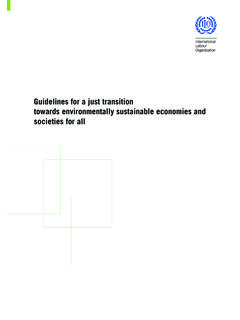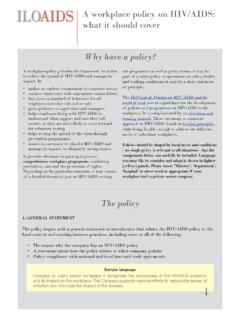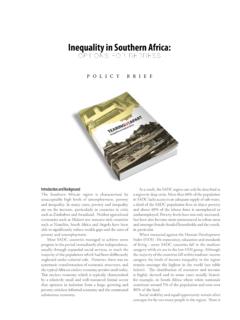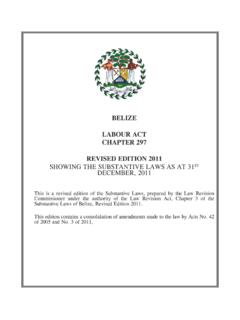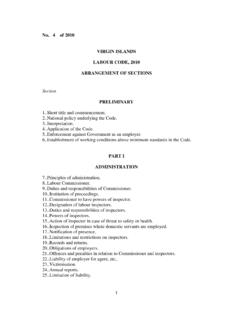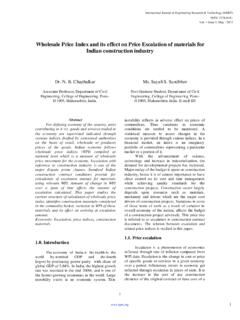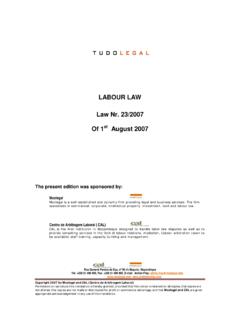Transcription of Labour Clauses in Public Contracts in Ghana: Recent ...
1 Labour Clauses in Public Contractsin Ghana: Recent experience in the Roads Sector Labour Clauses in Public Contracts in ghana : Recent experience in the Roads sector (Version ) Table of Contents Table of Abbreviations ..4 I. Background: Procurement and poverty reduction policies ..2 II. Labour -based construction in ghana ..3 III. Small and medium enterprise promotion ..6 IV. Labour Clauses in Public Contracts : DFR s Social Aspects of Construction Project ..7 A. Adoption by DFR of SAC experience and contract Clauses ..11 B. The question of casualisation : The example of social security C.
2 National policy on Labour Clauses in Public Contracts ..14 D. The implications of the SAC Project and developing Labour clause practice ..15 V. Principal Recommendations ..16 Annex I: Terms of Annex II: Persons Met ..19 Annex III: Documents studied ..21 Annex IV: System for classification of contractors ..24 Annex V: Excerpts from existing guidelines for Labour -based and other employment creating procedures ..25 Annex VI: Concerning Labour standards selected in the SAC Annex VII: The rights of Ghanaian workers ..35 Annex VIII: Comments on the draft Labour Annex IX: Comparison of contract Clauses .
3 40 Table of Abbreviations ABCCG Association of Building and Civil Contractors of ghana ASROC Association of Road Contractors CBMWU Construction and Building Materials Workers Union CPAR Country Procurement Assessment Report DANIDA Danish International Development Assistance DFID Department for International Development DFR Department of Feeder Roads EC European Communities FIDIC International Federation of Consulting Engineers GoG Government of ghana GPRS ghana Poverty Reduction Strategy IDA International Development Association ILO International Labour Organization ISODEC Integrated Social Development Centre MPBS Maintenance Performance Budgeting System RSDP Road Sector Development Programme SAC Social Aspects of Construction SSNIT Social Security and National Insurance Trust TOR Terms of Reference USAID United States Agency for International Development Labour Clauses in Ghanaian Roads Sector (version ) - 1 - Labour Clauses in Public Contracts in ghana .
4 Recent experience in the roads sector by David Stiedl and David Tajgman1 Executive summary Procurement is more than a procedure for purchasing goods and services; it is also a tool for policy implementation. The Government of ghana has placed poverty alleviation as its highest priority and has established policies accordingly. Employment creation and local enterprise promotion are important strategies for poverty alleviation. Employment itself, however, is not sufficient for alleviating poverty: fair wages, good conditions of work and equitable opportunity for waged employment are needed to ensure the strategic aim.
5 The Country Procurement Assessment Report (CPAR) addresses all aspects of procurement and this paper deals with the issue of employment creation and conditions of work as part of the procurement process. In 1986 ghana s Department of Feeder Roads (DFR) embarked with World Bank support on a programme to develop Labour -based construction contracting as a way of addressing a number of employment and livelihood constraints. DFR has recently undertaken a project the Social Aspects of Construction (SAC) Project emphasizing application of Ghanaian Labour standards for all those involved in the works.
6 This paper thus focuses on this unique pilot experience to inform the larger procurement process in ghana . Ghanaian procurement procedures have always stated that Ghanaian laws -- including Labour laws -- are fully applicable in the roads sector. The SAC project showed however that health and safety measures were not being taken, correct benefits were not being given to locally recruited temporary workers and casual workers continue to attract benefits distinct from other workers. It proved possible through project initiatives to improve the situation with the inclusion of explicit Labour Clauses , specifications, and bill items.
7 Similar Labour Clauses are gradually being included in other Contracts , both Labour - and equipment based. In addition a study of feeder road delivery in a wider context revealed that Labour -based employment creating activities were not being used as much as should have been possible given the success of the early initiatives. This paper makes a number of proposals to rectify the situation. Based on the study discussed more fully in the main text, it is recommended that: 1. Explicit Clauses addressing appropriate Labour standards be used in all construction related Contracts . 2.
8 A clear policy should be stated on the desirability of using Labour -based employment creating methods in construction wherever technically feasible and cost effective, and implementing strategies should continue to be developed to support this policy. 3. Systems be introduced for sustainable and local monitoring of compliance, measuring the impact on target groups, and facilitating review and adoption of policies, strategies and law. 1 This paper summarises the findings of a study by ILO consultants David Stiedl (civil engineer, rural infrastructure and Labour -based technology specialist) and David Tajgman (lawyer and Labour standards specialist) carried out in ghana from 21 February to 2 March 2003.
9 Terms of reference of the study are found in Annex I: The study focused primarily on the experience within the Feeder Roads Department of the Ministry of Transport, but the opportunity was taken to place this experience in the wider context of the Road Sector Development Programme, which involves the Department of Urban Roads and the ghana Highway Authority. Interviews were conducted with government officials from the Ministry of Transport and Ministry of Labour , consultants, contractors, union officials and some key donors. A list of people met is contained in Annex II found on page 19 and documents studied Annex III found on page 21.
10 Labour Clauses in Ghanaian Roads Sector (version ) - 2 - I. Background: Procurement and poverty reduction policies ghana is now in the second year of implementation of its comprehensive poverty reduction strategy (GPRS 2002-2004), developed by the Poverty Reduction Unit in consultation with Government, Civil Society and Development Partners. The strategy emphasises the provision of infrastructure, modernised agriculture based on rural development, enhanced social services, good governance and private sector development. The procurement of goods and services for the Road Sector Development and Strategic Plan alone is expected to involve an annual expenditure in the order of US$500 million2, and an efficient, transparent and effective procurement service is central to the success of the strategy.
